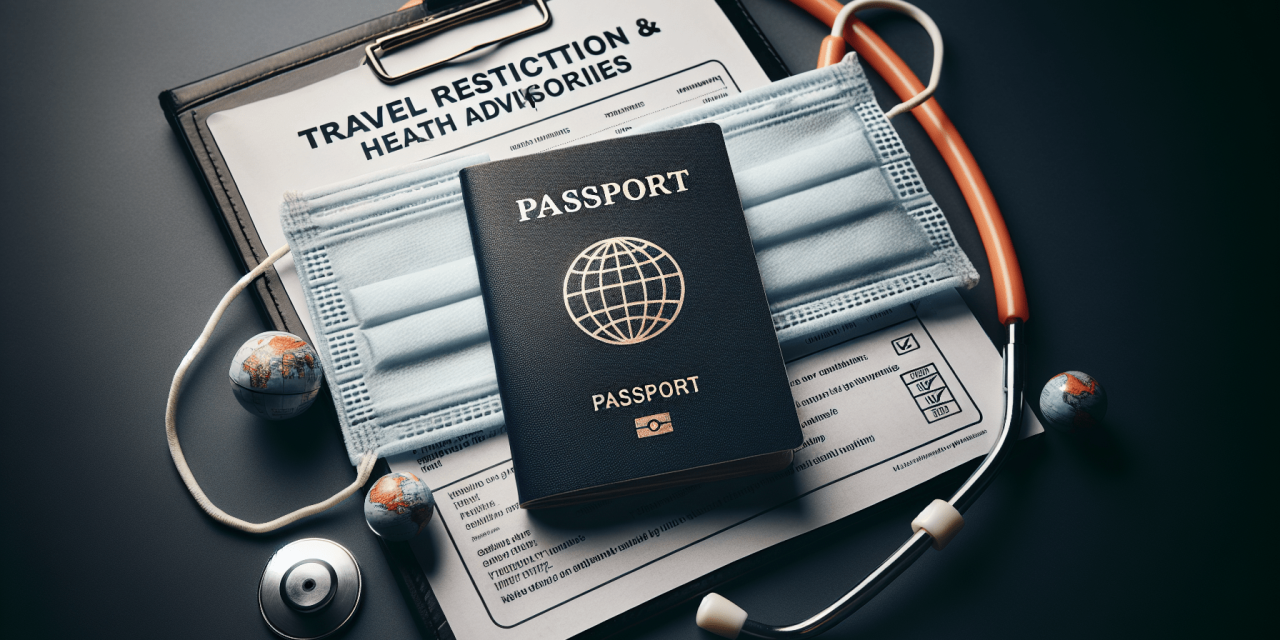Planning your next trip? Before you pack your bags and hop on a plane, it’s essential to stay informed about any potential travel restrictions or health advisories that may affect your journey. In the midst of rapidly changing conditions, it’s important to be prepared and prioritize your safety. Stay tuned as we provide you with the latest updates and guidelines to ensure a smooth and worry-free travel experience.
Travel Restrictions
International Travel Restrictions
When it comes to international travel, there are several restrictions that you should be aware of. Many countries have implemented travel bans or entry restrictions to help prevent the spread of COVID-19. These restrictions often vary from country to country and can include requirements such as negative COVID-19 test results, mandatory quarantine periods, or proof of vaccination. It’s important to check the specific regulations for your destination before you travel to avoid any complications or unexpected surprises.
Domestic Travel Restrictions
In addition to international travel restrictions, it’s also crucial to be aware of any domestic travel restrictions within your own country. Just like with international travel, certain regions or states might have implemented travel bans or restrictions to limit the spread of the virus. These restrictions can include limitations on non-essential travel, mandatory quarantine upon arrival, or even temporary lockdowns in high-risk areas. Be sure to research and stay updated on the latest guidelines and restrictions in your country before embarking on any domestic travel plans.
Health Advisories
General Health Advisories
Besides travel restrictions, there are general health advisories that apply regardless of your destination. These advisories are meant to provide guidance on maintaining your health and well-being while traveling. It’s crucial to follow these advisories to minimize the risk of contracting or spreading illnesses, including COVID-19. Some general health advisories include practicing good hygiene by washing your hands frequently, wearing masks in crowded places, maintaining social distancing, and avoiding close contact with sick individuals.
Destination-specific Health Advisories
In addition to general health advisories, there may be specific health advisories for your destination. These advisories take into account the current health situation at your chosen location. They can include information about outbreaks of diseases, specific precautions to take, or recommendations for vaccinations or medications. It’s vital to research the specific health advisories for your destination and follow any recommended precautions or guidelines to ensure your safety and well-being during your travels.
COVID-19 Guidelines
COVID-19 Testing Requirements
Due to the ongoing pandemic, many countries have implemented COVID-19 testing requirements for travelers. These requirements may include providing a negative COVID-19 test result taken within a certain timeframe before your departure or arrival. The specific testing requirements can vary from country to country, so it’s important to check the official guidelines and regulations of your destination. Make sure to schedule your test accordingly and have the necessary documentation ready to present upon request.
Quarantine Guidelines
In addition to testing requirements, some countries may also have mandatory quarantine guidelines for incoming travelers. This means that upon arrival, you may be required to self-isolate for a specified period, regardless of your test results. Quarantine guidelines can vary in duration, ranging from a few days to several weeks, depending on the country and the prevailing health conditions. It’s essential to be aware of these guidelines and prepare accordingly, ensuring that you have accommodations and provisions during your quarantine period.
Vaccination Requirements
Required Vaccinations
Vaccinations have always played a crucial role in ensuring public health, and in the context of travel, they can be particularly important. Some countries may require specific vaccinations as a condition of entry. These required vaccinations are typically designed to protect both the traveler and the local population from contagious diseases prevalent in certain regions. It’s essential to research and check the vaccination requirements of your destination well in advance of your trip. Ensure that you have the necessary immunizations and keep your vaccination records with you.
Proof of Vaccination
In light of the COVID-19 pandemic, proof of vaccination against the virus has become increasingly relevant for travelers. Some countries may require proof of vaccination as part of their entry requirements. This can be in the form of a vaccination certificate or card. It’s crucial to keep your vaccination documentation easily accessible and up-to-date. Make sure to check the specific requirements of your destination regarding proof of vaccination to avoid any issues when traveling.
Entry Visas and Documentation
Entry Visa Requirements
Apart from travel restrictions and health-related requirements, entry visas can also be a crucial aspect of travel planning. Entry visa requirements vary depending on the country you plan to visit and the purpose of your visit. Some countries may require travelers to obtain a visa before entry, while others have visa-free entry or offer visas upon arrival. It’s essential to research the entry visa requirements of your destination well in advance and make the necessary arrangements if a visa is needed.
Additional Documentation
In addition to entry visas, there may be other documentation that you need to prepare before traveling. This can include a valid passport with a sufficient validity period, travel insurance coverage, proof of accommodation reservations, and a detailed travel itinerary. It’s important to gather all the necessary documentation beforehand and ensure that they are readily accessible when needed during your journey. Adequate preparation with the required documentation can help streamline your travel experience and prevent any unnecessary delays or complications.
Travel Insurance
Coverage for Medical Emergencies
Travel insurance is an essential aspect of trip planning, especially when it comes to medical emergencies. Accidents or illnesses can happen at any time during your travels, so having travel insurance that includes coverage for medical emergencies is crucial. This coverage can help cover expenses such as hospitalizations, doctor visits, medications, and emergency medical evacuations. Before purchasing travel insurance, carefully review the coverage details to ensure that it includes comprehensive medical emergency coverage suited to your needs.
COVID-19 Coverage
Given the impact of the COVID-19 pandemic on travel, it’s important to consider travel insurance that offers specific coverage for COVID-19-related situations. This can include coverage for cancellations or interruptions due to COVID-19, medical expenses related to COVID-19 treatment, and emergency evacuation due to COVID-19 illness. Review the policy terms and conditions to understand the extent of COVID-19 coverage provided by the insurance provider and choose an appropriate policy that aligns with your travel plans and potential risks.
Pre-Travel Preparation
Consulting with a Healthcare Professional
Before embarking on any trip, it’s advisable to consult with a healthcare professional to ensure that you are in good health and medically fit for travel. Depending on your destination and personal health conditions, your healthcare provider may recommend specific precautions or vaccinations. They can also provide guidance on managing any pre-existing health conditions during your travels. Consulting with a healthcare professional helps ensure that you are adequately prepared for your journey and have up-to-date medical advice relevant to your specific circumstances.
Packing Essential Medications
If you have any pre-existing medical conditions or require regular medications, it’s crucial to pack an ample supply of essential medications for your travels. Make sure to carry more than enough medication to last the duration of your trip and any unexpected delays. It’s also advisable to have a prescription or a doctor’s note for the medications, especially for controlled substances or injectables. Having essential medications readily available can help you manage your health effectively during your travels and mitigate any potential medical emergencies.
Safety and Security
Crime Rates and Safety Tips
When traveling, it’s important to be aware of the safety and security situation at your destination. Research the crime rates and common safety concerns for the area you’ll be visiting. Stay informed about any potential risks or areas to avoid. It’s also crucial to follow general safety tips such as staying in well-lit areas, being cautious with your belongings, and avoiding unnecessary risks. By staying vigilant and taking necessary precautions, you can help ensure your personal safety while traveling.
Emergency Contacts
Before you travel, make a note of emergency contact numbers for your destination. This can include local emergency services, embassy or consulate contact information, and the contact details of your travel insurance provider. Having these emergency contacts readily available can be invaluable in case of any unforeseen circumstances or emergencies during your travels. It’s important to keep the contact information easily accessible, either on your phone or in a physical notebook, to ensure quick and efficient access in times of need.
Healthcare Facilities at Destination
Availability of Medical Facilities
It’s essential to be aware of the availability and quality of healthcare facilities at your destination. Research the local medical infrastructure, including hospitals, clinics, and pharmacies. Find out if they have the necessary facilities and equipment to handle potential medical emergencies or treat any pre-existing conditions. Additionally, consider if there are any language barriers and if it’s advisable to have a translator or interpreter available. Being aware of the healthcare landscape at your destination can help you make informed decisions and seek medical assistance if needed.
Quality of Healthcare
Not all healthcare facilities offer the same standards of care, so it’s important to assess the quality and reliability of healthcare services at your destination. Look for information about local hospitals and clinics, such as accreditation or international recognition. Online reviews or recommendations from trusted sources can also provide insights into the quality of healthcare available. Knowing the quality of healthcare services can help you make informed decisions and seek appropriate care if the need arises during your travels.
Resources for Up-to-Date Information
Government Health Department Websites
Government health department websites are reliable sources of up-to-date information regarding travel restrictions, health advisories, and other relevant guidelines. These websites often provide official updates on the current COVID-19 situation, travel requirements, and any other health-related information that travelers need to be aware of. It’s advisable to regularly check these websites for the most accurate and current information regarding your planned travel destination. Staying informed through official government sources can help you make well-informed decisions and ensure a smoother travel experience.
Travel Advisory Websites
Travel advisory websites are another valuable resource for travelers seeking information on travel restrictions and health advisories. These websites aggregate information from various sources and provide comprehensive updates on travel alerts, entry requirements, and other important details for specific destinations. They often include country-specific information, travel advisories, and safety tips. Consulting these advisory websites can help you stay informed about the latest developments and guidelines, ensuring that you are well-prepared and aware of any potential risks during your travels.
In conclusion, as you prepare for your travels, it’s crucial to be aware of any travel restrictions, health advisories, and guidelines in place. Familiarize yourself with the international and domestic travel restrictions, as well as any specific health advisories for your destination. Stay updated on COVID-19 guidelines, including testing requirements and quarantine guidelines. Be aware of any vaccination requirements and ensure that you have the necessary proof of vaccination. Understand the entry visa requirements and gather all the required documentation. Consider travel insurance coverage for medical emergencies and COVID-19-related situations. Consult with a healthcare professional and pack essential medications. Stay informed about safety and security, and keep emergency contact numbers readily available. Research the availability and quality of healthcare facilities at your destination. Lastly, use official government health department websites and travel advisory websites as resources for up-to-date information. By taking these precautions and being well-prepared, you can ensure a safer and more enjoyable travel experience.












